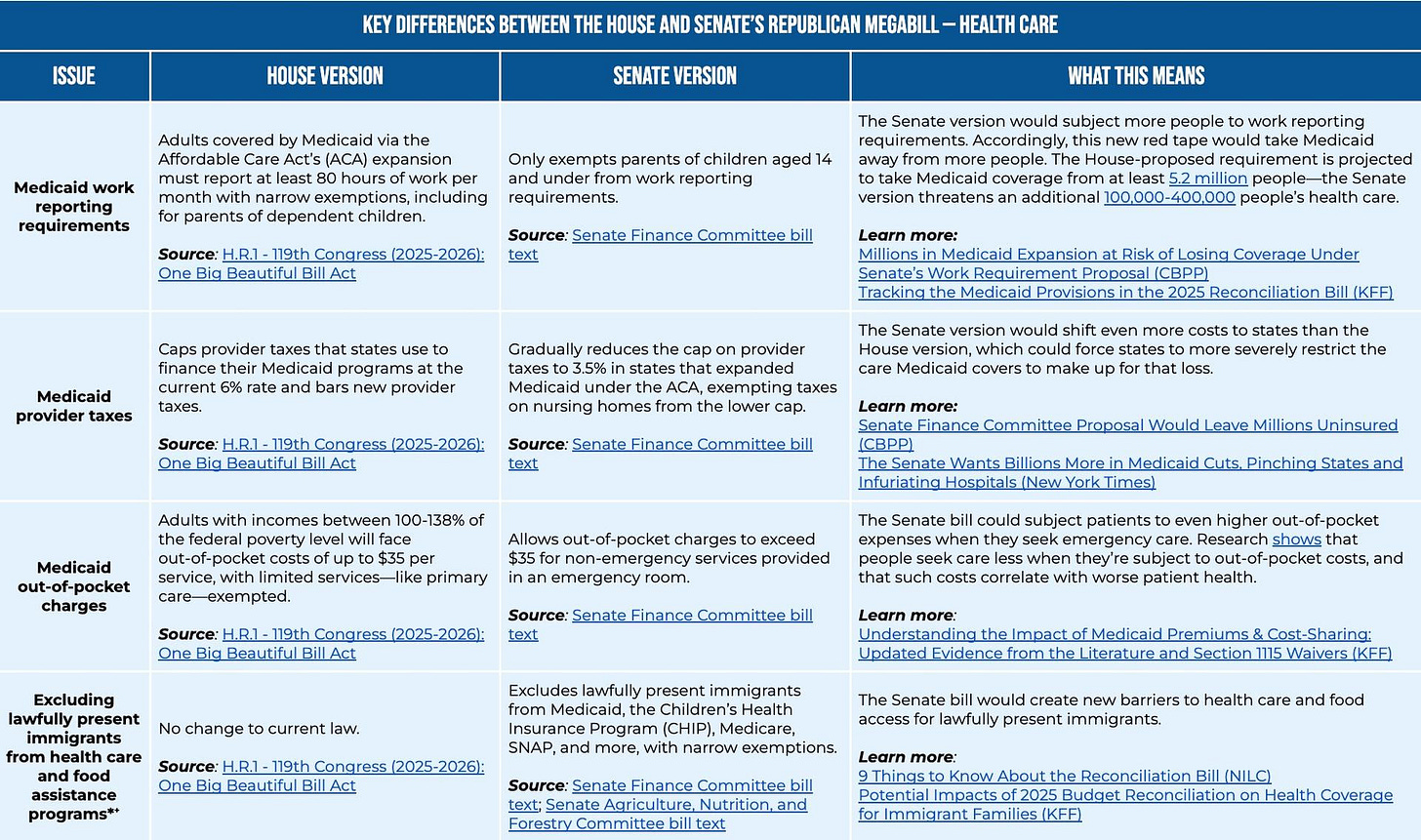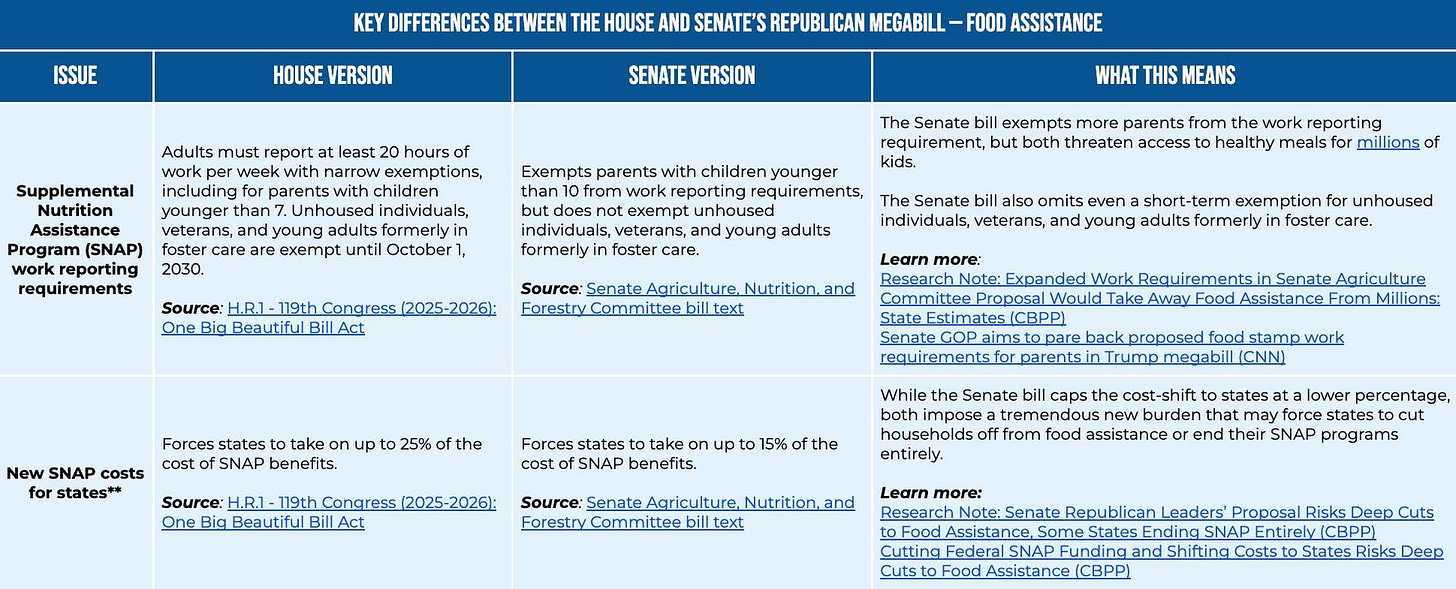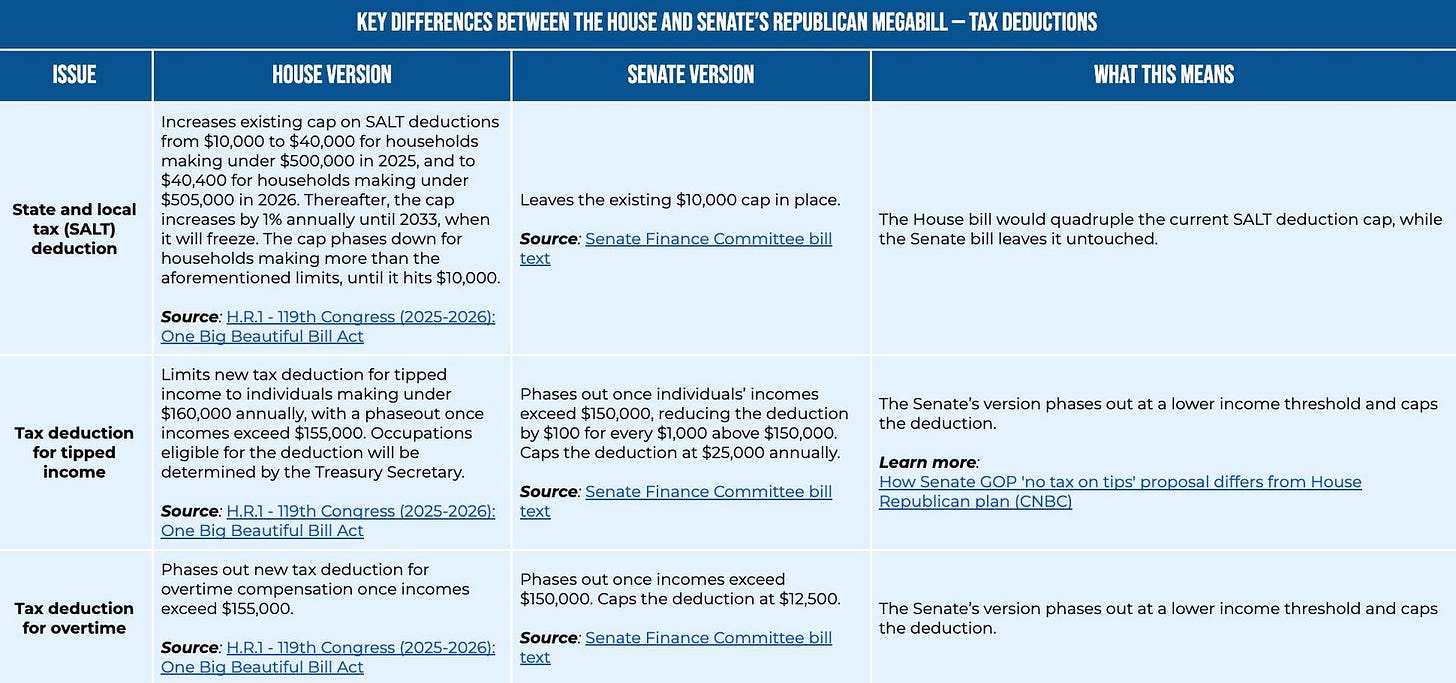Reporting indicates that the Senate will kick off votes on the Republican megabill as early as Thursday or Friday. This will likely tee up Senate votes through the weekend. If the Senate-crafted bill passes, it must win House approval before it can go to the President to become law — and all of that must happen by next Friday to meet the President’s preferred deadline (July 4).
It’s extremely ambitious, but technically possible. While Congress is scheduled to be in recess next week, Speaker Johnson told House members to keep their schedules flexible in case a vote is imminent.
More info below on the various Senate rules, differences between the House and Senate bills, the likelihood of certain provisions remaining in the Senate bill based on Senate rules, and how we can take action.
Senate debate
Senate debate time on a reconciliation bill is fixed at 20 hours, split evenly between the parties. Republicans could opt to not use their full 10 hours of debate to speed things along, but Democrats will likely use theirs.
Once time is up, the Senate can only add additional debate time by unanimous consent—that is, if all 100 senators agree. Otherwise, the Senate may only consider amendments and a vote on final passage. There is no limit to the number of amendments that can be offered, which typically results in an hours-long series of amendment votes known as “vote-a-rama.” More on that later.
The Byrd Rule and points of order
The Senate’s Parliamentarian determines whether the bill’s provisions comply with Section 313 of the Congressional Budget Act of 1974, better known as the “Byrd Rule.” The Byrd Rule deems a provision ineligible for reconciliation if it meets any of the following criteria:
It does not change expenditures or revenues, or the conditions by which they are made or collected.
The changes to spending or revenues are merely incidental to the relevant provision. The nonpartisan Senate Parliamentarian makes the “merely incidental” determination, arguably the Byrd Rule’s most subjective element.
It is outside the jurisdiction of the committee that submitted the provision.
The change in spending or revenues does not comply with the relevant committee’s reconciliation instructions.
It increases the deficit after 10 years. So, if a provision increases the deficit without an offset, it must wind down or expire to avoid violating this rule.
It changes Social Security.
If the Parliamentarian advises that a provision does not comply with the Byrd Rule, the provision is typically modified or removed—either preemptively before the bill reaches the floor, by floor amendment, or by point of order.
If the Parliamentarian advises against a provision and the provision is not removed before the bill reaches the Senate floor, a senator may raise a point of order during floor debate. Think of this like an attorney “objecting” in a courtroom. It is possible for the Senate’s Presiding Officer—a member of the majority party—to ignore the Parliamentarian’s guidance, determine that the point of order is without merit, and allow the provision to stay in place. This has rarely happened, although stakeholders have suggested that the GOP should consider this tactic to achieve their goals.
If a point of order is raised and sustained by the Senate’s Presiding Officer, the provision is stricken — unless a senator moves to waive the point of order and retain the provision. In that case, the Senate votes on whether to keep the provision in the bill, with 60 votes required to do so.
House and Senate Bills
Both the House and Senate Republicans’ reconciliation proposals will both give more to the richest Americans, while taking from those who have the least. The Congressional Budget Office projects that the poorest 10 percent of households will lose an estimated $1,600 a year, while the richest 10 percent gain about $12,000 a year. These giveaways to the ultra-wealthy and corporations are coupled with billions of dollars for the already-bloated Pentagon budget and a new slush fund to tear apart immigrant families in violation of the law. All of this is paid for by taking health care and food assistance from millions.
While the House and Senate versions of this megabill produce the same winners and losers, there are distinctions between the two. The tables below outline some of the most notable differences on key issues.
A few housekeeping notes:
This is not an exhaustive list and reflects differences at the time of publication.
This table does not cover provisions that remain the same across the House and Senate.
Finally, provisions that the Senate Parliamentarian has determined violate the Byrd rule are marked ** and *+.
At the time of publication, the Parliamentarian has not concluded her review and, therefore, could rule that additional provisions violate the Byrd rule. These rulings do not guarantee that the provisions will be eliminated entirely: Republicans could rewrite them to conform to the Senate’s rules or attempt to retain them as-is.
**: The Senate Parliamentarian has ruled this provision violates the Byrd Rule.
*+: The Senate Parliamentarian has ruled this provision violates the Byrd Rule with respect to SNAP only; she has not reviewed the health care-related provisions at the time of publication.
Vote-a-rama
Like markups, vote-a-rama offers the minority a chance to force votes on their priorities. However, the amendments must adhere to specific parameters:
The amendments must be germane.
The amendments cannot violate the Byrd Rule.
The amendments must lower the deficit or leave it untouched. Amendments cannot raise the deficit, except amendments that strike whole provisions from the bill. These are permitted even when the eliminated provision would reduce the deficit.
Senate passage
Once no more amendments are offered, the Senate votes on passage. Passage requires a simple majority vote (51 of 100).
Take action
Sign up for a phone bank this week hosted by Indivisible, Working Families Party, MoveOn, and other partners to mobilize millions of Americans who this bill could harm most. Shifts are open Monday-Thursday, June 23-26, from 6-8pm ET / 3-5pm PT.
Write a letter to the editor of your local paper. Use our toolkit for guidance. If your letter isn't published, post it on social media and share it with your network.
Talk to like-minded people in your area via Indivisible’s Neighbor2Neighbor program! They’ll get you ready to knock on doors in your neighborhood, on your own time, so you can mobilize your neighbors against this bill.
Amplify and share the content we are posting on Substack, Twitter, Facebook, Bluesky, Instagram, TikTok, and Threads.
The vote-a-rama process we mentioned above allows Senate Democrats to propose change after change to this bill, with virtually no limit on how many painful votes they can force Republicans to take. Send your proposed amendments to your Democratic senators here and remind them to do all they can to force as many painful votes as possible.
Call your two Senators demand they oppose this destructive bill. Script is below and you can find your two Senators at this link.
YOUR SCRIPT:
Hi, my name is [NAME] and I’m a constituent from [CITY, STATE].
I’m calling to urge Senator [NAME] to oppose H.R. 1, the budget reconciliation bill, and its harmful cuts to vital government programs.
Congress should pass a fair and responsible budget that helps working families and communities, not one that slashes our benefits to fund tax cuts for the wealthy.
Thank you for your time and consideration.
IF LEAVING VOICEMAIL: Please leave your full street address to ensure your call is tallied.










